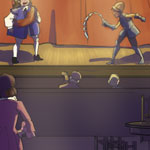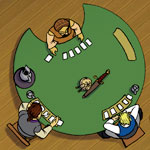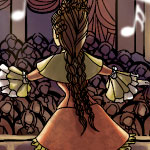Entertainment

Cabaret
Cabaret is a genre of variety shows that is popular in the saloons of Aradie. While cabaret typically focuses on singing and dancing, it can include comedic skits, trained animals, illusionists, and more. Cabaret is defined more by its venue than its style. Cabaret is performed in eating and drinking establishments, where the entertainment is designed to keep patrons in their seats so that they will buy more drinks.
Cabaret developed as a reaction to the theatre troupes of the 16th century. A performance by one of these troupes would consist of one single, elaborate play lasting several hours. To compete, the taverns recruited performers to perform at their drinking establishments. The acts were short with performers rotating out on a regular basis, and the performances varied greatly from night to night, depending upon which performers were available.
Over the past century or so, cabaret has developed several norms. Performances are overseen by a compère who introduces the acts, moves them offstage, and manages the crowd. Patrons expect ribald comedy, pretty women in revealing outfits, handsome men in revealing outfits, a patter act with rapid, clever dialogue between two performers, and a pantomime set to music. Cabaret is also subversive. The most popular acts are parodies that skewer high-minded dramas and operas. Powerful people are lambasted through travesties that make the rich and noble look foolish, much to the delight of the common, and most likely inebriated, audience.

Gambling
More than just a pastime, gambling is a powerful economic and social force throughout western Japethe and the colonies on Everique. The passion for wagering first took root on a grand scale in the Freeports of the Kennard Reach, where it is not only fashionable but also a sign of good breeding among the idle aristocracy. Gambling spread from the Kennard Reach to Guiern, Saronne, and Morante. When those countries established colonies in Everique, they brought their love of wagering with them to the new world.
The people of the Kennard Reach have a reputation for betting on everything, including sports, military actions, births, and deaths. Their aristocracy commonly starts playing betting games after supper and will happily play till dawn. Fortunes are made and broken at the gaming tables. While gambling is a popular pastime in Sherbourg, even its wealthiest traders do not have the deep pockets of the aristocrats from the old world and the games in the colonies deal with trivial sums compared to those of the old world.
Gambling is divided heavily by class and wealth. The pastime is most commonly seen as the vice of the wealthy, who are known to squander huge sums on risky bets. The upper classes gamble in private clubs, which limit its membership to those of the proper social rank. The less well-to-do must feed their desire for action in the hells, gambling dens that are open to the public. The name originated in Rost, a city in the Kennard Reach, as an allusion to the hells' shady reputation as places for the poor or damned. The name and its vivid imagery stuck and spread rapidly. Soon after, some wit started calling the dealers and servers at the hells "hellions." That name stuck too.
Bets are customarily witnessed by a third party to prevent welching. The private clubs keep ledgers to record wagers to prevent convenient lapses of memory. Any gambling debts are taken very seriously, and unpaid debts sully a person's gloire, as they call into question the gambler's character and credibility. If the debts are high enough, they could force a person to flee the town or even the country - whether to avoid a scandal if the debtor is among the highborn or to prevent the breaking of thumbs - or worse - if not.
Dice games are the most prevalent form of gambling, because of the low cost of dice and the simple fact that dice can be rolled most anywhere. Hazard is by far the most popular dice game and is a common sight in the saloons and hells of Sherbourg. Cards are a close second to dice with most card games being trick-taking games such as piquet or écarté, but poque, a hand-building game, is frequently played as well. A recently invented game called roulette is growing in popularity because of its ease of play and the dramatic use of a spinning wheel.
Gamblers also enjoy betting on combative or competitive activities, such as cock fights, dog fights, dogs killing rats, target shooting, wresting, and boxing. Most of these activities are not offered at the gambling clubs for the wealthy, driving some of the upper classes to slum in the hells for the bloodier entertainments. Because of the inclement weather of Aradie, horse races are not as popular in Sherbourg as they are in the southern colonies.

Opera
Opera is considered the pinnacle of art among the Japethan nobility. It combines the work of a full orchestra of musicians, a number of soloist singers, and a chorus to create a dramatic work. The musical score and words of the songs (called a libretto) tell a narrative that can be tragic, comical, or romantic. Most operas have elaborate sets, costumes, and scenery, making the entire production one of fantastical escapism.
Opera first developed in the early 16th century in Felaire, a country known for its elaborate court. Opera was an attempt to restore the dramatic works of ancient Hellenas. The resulting art form quickly transcended its ancient roots and became the most avant-garde art form of the era. Opera soon spread throughout Japethe and came to Saronne in the reign of Raimon IV, when it became fashionable for the nobility, the rich, and the ambitious. Opera is so popular in Japethe that special houses are constructed to host performances. These houses are sometimes so large and elaborate that they eclipse temples to the Great Spirits. The presence of an opera house is essential for any city to be considered cultured by society.
« Return to the Almanac Index

